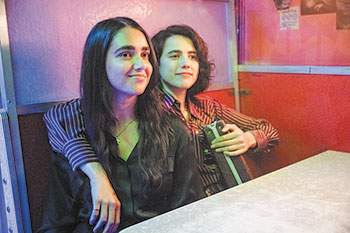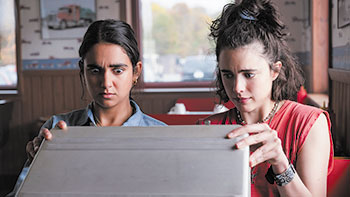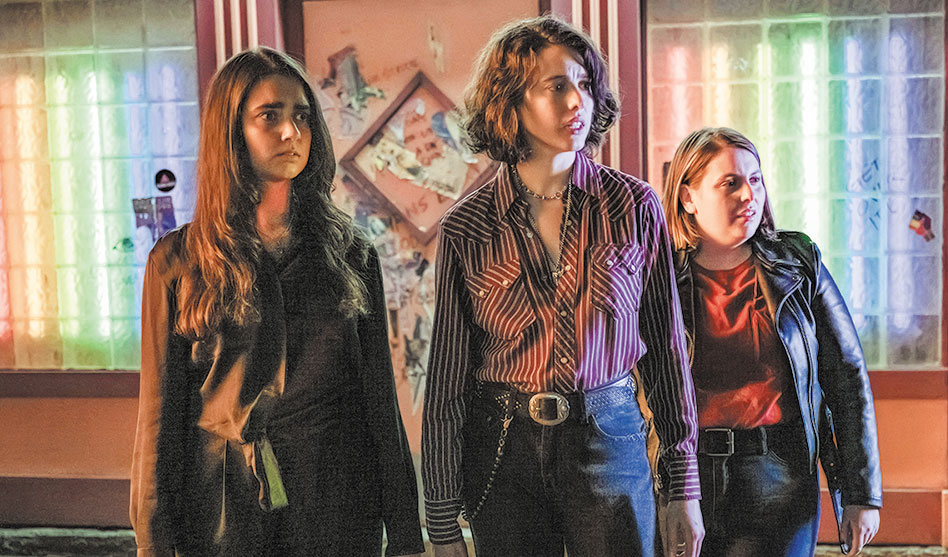After ‘Drive-Away Dolls,’ Geraldine Viswanathan is ready for her next lesbian movie
CHRIS AZZOPARDI | Q Syndicate
It’s quite the compliment to her time filming Drive-Away Dolls that Geraldine Viswanathan, after playing her first onscreen queer role, would “do anything” to make it happen again.
“If I can weasel my way in there, honey, I’m going to. I’ll hold the boom. I’ll do catering,” says Viswanathan, an Australian actress who is part Swiss and part Indian and who earned recognition for her breakout role in 2018’s teen sex comedy Blockers.
She might be in luck, considering the filmmaking team behind Drive-Away Dolls. Ethan Coen of the Coen brothers and longtime film editor Tricia Cooke, who is Coen’s wife and also an out lesbian (they’ve been in an open marriage for over 20 years) told me recently that they are just getting started.
The film is the creators’ first lesbian B-movie in a planned trilogy of sorts. It stars Viswanathan as Marian, who’s yet to be laid much to the dismay of her freewheeling best friend, Jamie (Margaret Qualley), Jamie has recently gone through a nasty breakup with her girlfriend Sukie (Beanie Feldstein).
Together, Marian and Jamie head out on a road trip down to Florida, where it may be the ‘90s but “don’t say gay” is still implied when they have a run-in with government officials for reasons that definitely seem like something Florida political figures would waste their time prosecuting.
During our recent chat, Viswanathan spoke about the first time she played a queer character,” the “quietly revolutionary” tone of the film and how it honors lesbian bars as the safe spaces they’ve always been.
CHRIS AZZOPARDI: How have you been describing this movie to your friends? Geraldine Viswanathan: I describe it as a Coen movie, first and foremost, and I say it’s a wacky lesbian screwball road trip comedy caper where we’re driving down South, and we have a package that some people really want.
Is it too much of a spoiler to say what’s in the package? When I’m talking to my friends, I do. And I think there’s no surprises at this point. I’ve done so many movies in this vein, so I think it’s not a shock.
 What are your thoughts on this film being released during a politically precarious time for queer people? I think Drive-Away Dolls is very quietly revolutionary. Initially, when reading it and while making it, it was just: Let’s make the most outrageous, funniest, wildest, queerest comedy that we can. Now, as the movie’s releasing, it does feel like there’s this added significance where I feel like it’s a really great time actually for queer movies, and it’s rare that the three leading characters in a big theatrically released movie are queer women.
What are your thoughts on this film being released during a politically precarious time for queer people? I think Drive-Away Dolls is very quietly revolutionary. Initially, when reading it and while making it, it was just: Let’s make the most outrageous, funniest, wildest, queerest comedy that we can. Now, as the movie’s releasing, it does feel like there’s this added significance where I feel like it’s a really great time actually for queer movies, and it’s rare that the three leading characters in a big theatrically released movie are queer women.
The way that sex and sexuality are treated in this movie, it’s something that I wish that I could have seen on screen growing up, where it’s shameless and approached with lightness and silliness and authenticity. It really feels like the male gaze is not present in this movie. That’s a testament to the way that Ethan made space for Tricia’s vision and experience and what she has to say. It’s one of the best things that a movie can do that I think is within our power.
You mentioned we don’t see many lesbian women on screen, but then, of course, you are Indian, so that kind of intersectionality is even more rare. Can you talk about the importance of that representation? I feel like my first movie being Blockers, it felt significant to be the most outrageous and most sexual character in that movie. And then to be a South Asian young woman talking about how she wants to get laid — historically, South Asians are very desexualized and not really in those roles. I know that Ethan and Trish wrote this movie in the ’90s [but] I don’t know if I would’ve been in this movie in the ‘90s. So I think it’s really cool and that is not lost on me.
Is Marian your first queer character? I’m trying to think. Oh, I just remembered I did a play in Sydney that was a lesbian love story; that was the bell ringing in my head. But that’s theater. It’s a different world. It was like a lesbian rom-com with two girls. Super cute. It was set in high school and it was called Ellie and Abbie and this queer writer, Monica Zanetti, wrote it in Australia, and we did it at a local theater, and then they turned it into a movie, actually. There’s actually no men at all, which I don’t know if I’ve seen. But yeah, this is my first time on screen.
 With a film about young queer people, what is it like to be the one sharing that narrative with kids who might be looking to see versions of themselves on screen? It’s super meaningful. I think if there’s any throughline in my career, it’s just liberation and freedom and self-acceptance, and it just feels like this is a part of that. And I love just working with women. I don’t need to play a straight love story ever again. No shade to straight men, but I’m good. I don’t need that. I can really live without it. So I think just getting to work with Margaret, just to have all my scenes with Margaret, was such a dream. I love that, not having to deal with too many male egos.
With a film about young queer people, what is it like to be the one sharing that narrative with kids who might be looking to see versions of themselves on screen? It’s super meaningful. I think if there’s any throughline in my career, it’s just liberation and freedom and self-acceptance, and it just feels like this is a part of that. And I love just working with women. I don’t need to play a straight love story ever again. No shade to straight men, but I’m good. I don’t need that. I can really live without it. So I think just getting to work with Margaret, just to have all my scenes with Margaret, was such a dream. I love that, not having to deal with too many male egos.
Did you draw from any personal experience or research to authentically capture the essence of Marian’s queer identity? I definitely did. I think it’s all invisible work. It’s all work that I did for myself to help me understand Marian, but I thought about my sexual awakenings and relationships and even people that I’ve been friends with and then been like, “Wait a minute.”
Yeah, there was plenty that I related to with Marian, even though on the surface I thought I didn’t. But upon deeper reflection, I was like, “Wait, no, I totally relate to her” in that she’s kind of specific and has a big, easily bruised heart and runs deep and is sort of an old soul and would rather skip all the frivolousness of dating and sleeping around and just wants to be cozy and wifed up and go to rallies.
This movie is a love letter to lesbian bars. Was part of the research for this movie to go to any lesbian bars? Yeah, that’s what’s so cool. We did a press junket yesterday in this lesbian bar, Henrietta Hudson in New York, and it’s one of two lesbian bars in the city left. And we found out that there’s only 23 lesbian bars in America, and that just broke my heart. I can’t believe it. That’s so sad. So to have a love letter to those safe spaces is, again, so quietly revolutionary.
Chris Azzopardi is the Editorial Director of Pride Source Media Group and Q Syndicate, the national LGBTQ+ wire service. Reach him via Twitter @chrisazzopardi.

